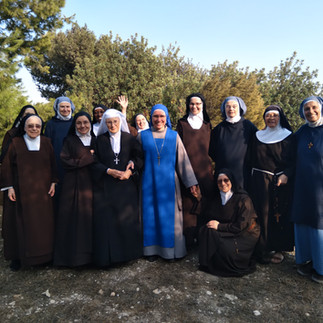Meeting of the Contemplative Prioresses of the Holy Land
- Carmel du Pater Noster

- Nov 13
- 3 min read

Carmel of the Pater Noster – November 3, 2025
On November 3, 2025, our community at Carmel of the Pater Noster had the great joy of welcoming the Prioresses of the Contemplative Sisters of the Holy Land to our monastery for their biannual meeting.
This moment of fraternal and spiritual communion brought together, in an atmosphere of prayer and sharing, several contemplative communities present in the Holy Land.
Representing Carmel were the Prioresses of the four Carmelite monasteries in the region: Haifa, Nazareth, Bethlehem, and Jerusalem.
We also had the joy of welcoming the Prioress of the Benedictine Sisters of the Mount of Olives, the Prioress of the Benedictine Sisters of Abu Gosh, as well as the Abbess of the Poor Clares of Jerusalem and that of the Poor Clares of Nazareth.
The monastic family of Bethlehem, of the Assumption of the Virgin and of Saint Bruno was also represented by the Prioresses of their three communities: Bet Gemal, Deir Rafat, and Lavra Netofa. And the Prioress of the Contemplative Sisters of the Incarnate Word of Nazareth joined this assembly for the first time.
This day was marked by a very special moment of grace: the celebration of Mass presided over by our Patriarch, Cardinal Pierbattista Pizzaballa, who came to share with us a deeply evangelical message on gratuitousness.
In his homily, he invited us to contemplate and live gratuitousness as a path to inner freedom and love.
Some notes from the Patriarch's homily
Living in gratuitousness is one of the most profound and luminous challenges of Christian life. It is not simply a matter of doing something without asking for anything in return, but of adopting an inner attitude that reflects the way God loves: unconditionally, without calculation, without expectations.
1. Welcoming God's generosity
Generosity does not come from human effort, but from the awareness of having been loved first. When we recognize that everything we are and everything we have is a gift, we become capable of giving in turn.
“You received without payment, give without payment.” (Mt 10:8)
2. Freeing oneself from the need for recognition
Gratuitousness implies going beyond the desire to be seen, praised, or rewarded.
It is an action that finds its joy in the good itself, not in the reward.
3. Educating oneself in discretion and silence
Many gratuitous gestures are hidden, silent, invisible.
Living in gratuitousness also means accepting that the good done may never be recognized.
4. Serving without possessing
In gratuitous service, the other is not a means to feel good, but an end in itself.
It is a love that does not hold back, does not control, does not impose.
5. Cultivating prayer
Prayer is where we learn gratuitousness, because it is there that we receive without merit and give time, attention, and listening without expecting anything in return.
6. Living non-utilitarian relationships
Gratuitousness manifests itself
A day of grace and communion
This gathering was a time of grace and deep communion for each of us.
Through prayer, sharing, and fraternity, we tasted the beauty of a life given to God in the diversity of our contemplative charisms.
The word of the Cardinal Pizzaballa resonated as a call to live each day in the gratuitousness of love received and offered, at the very heart of our monasteries and our fraternal relationships.
We give thanks for this special day of unity, joy, and hope, and we entrust to the Virgin Mary, Our Lady of Mount Carmel, the spiritual fruitfulness of this communion between our contemplative communities in the Holy Land.
Some photos of that day:



























Comments